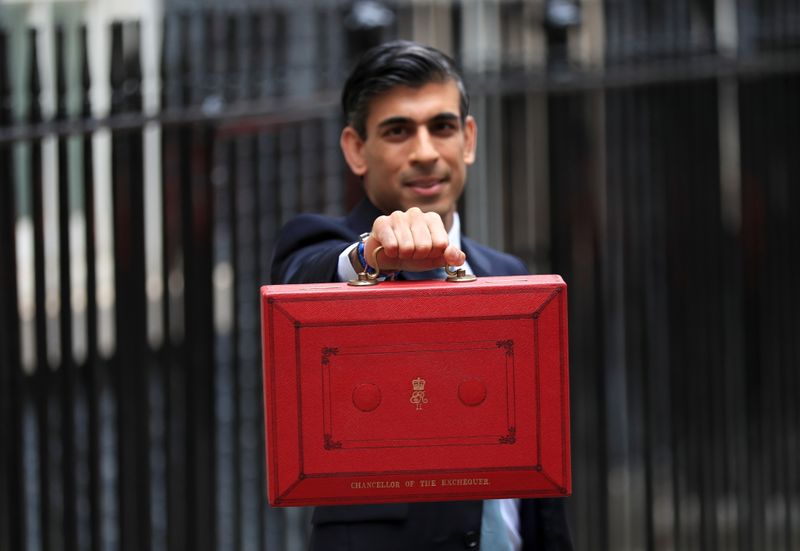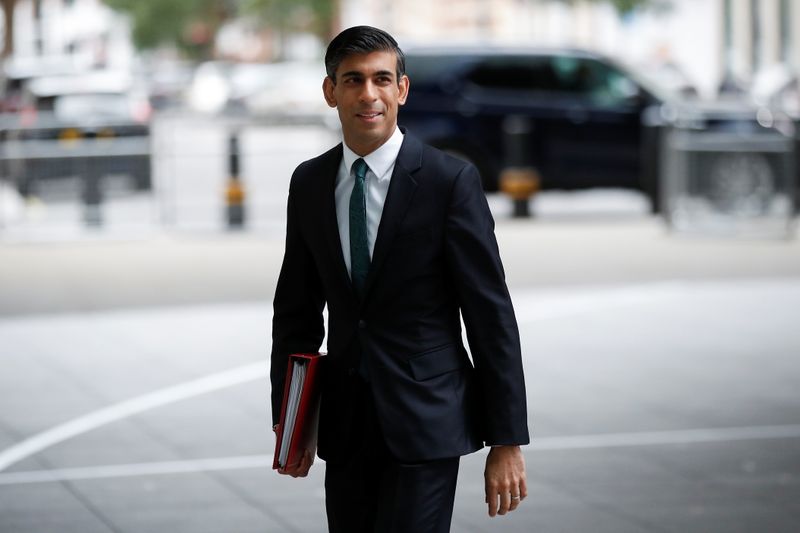By David Milliken, Andy Bruce and William Schomberg
LONDON (Reuters) -Finance minister Rishi Sunak used a stronger forecast for Britain's post-lockdown economic recovery to promise higher public spending and he vowed to protect households from the sharp rise in inflation that could approach 5% next year.
The new projections showed the world's fifth-biggest economy was expected to grow by 6.5% in 2021, up from a forecast of 4.0% made in March, when Britain was still in a coronavirus lockdown.
"Today's budget does not draw a line under COVID. We have challenging months ahead," Sunak said. "But today's budget does begin the work of preparing for a new economy post-COVID."
Sunak announced multi-billion-pound investments in infrastructure, education and other areas to help Prime Minister Boris Johnson meet his "levelling up" promises to voters
In a speech to parliament on Wednesday, he also moved to ease a cost-of-living squeeze for low-earners.
But the plan came with a cost: Britain's budget forecasters said the state's tax take was set to be its biggest since the 1950s, after big tax hikes announced by Sunak in March and September, while public spending was set for its largest sustained share of economic output since the late 1970s.
Sunak said he wanted to return to his Conservative Party's traditional policy of cutting taxes before the next election, due by 2024.
"My mission over the rest of this parliament is for taxes to be going down by the end, not up," Sunak said during an online discussion organised by his Conservative Party after his speech.
The higher growth forecast for 2021 meant the economy was expected to regain its pre-pandemic size at the turn of this year, not in the second quarter of 2022 as predicted in March although it was still later than in other countries.
Long-term damage to the economy would also be lower, with 2% of output lost permanently, compared with 3% estimated before.
Sunak - who racked up Britain's biggest-ever peacetime budget deficit to combat the coronavirus - will now be able to borrow less than previously expected.
The Office for Budget Responsibility projected the deficit for the 2021/22 financial year would be 7.9% of economic output - down from its previous forecast of 10.3% and almost half the size of last year's historic shortfall.
The OBR cut its borrowing forecasts for the following years too.
British government bond prices rose and the yield on 30-year gilts hit a one-month low on reduced public debt sale plans.
Sunak defied expectations of a spending squeeze, saying all government departments would all get a real-term increase.
But Ben Zaranko, an analyst at the Institute for Fiscal Studies think tank, said the rises were not enough to reverse cuts of the 2010s. "Austerity is over, but not undone," he said.
Sunak announced new fiscal rules: underlying public sector net debt must be falling as a share of GDP and day-to-day public spending must be balanced by revenues within three years.
The OBR said Sunak was just about on course to meet those rules.
Sunak lessened the hit for working low-income families from the loss of an emergency welfare top-up. He also cut business rates for a year for hard-hit sectors such as retail and hospitality and froze them for others.
The benefit changes cost more than 2 billion pounds a year, while the cuts in business rates cost 2.7 billion pounds next year and more than 900 million pounds a year thereafter.
Drinkers would be spared a scheduled increase in duty on alcohol worth more than 600 million pounds a year.
"WILLING TO ACT" ON INFLATION
Sunak dedicated much of his speech to the risks posed by rising inflation.
"I understand people are concerned about global inflation – but they have a government here at home ready and willing to act," he said.
The OBR said inflation would hit almost 5% next year with post-Brexit migration and trade rules exacerbating supply bottlenecks.
Sunak announced further measures to ease a shortage of truck drivers and said his increases in spending would done "keeping in mind the need to control inflation."
A big risk for the state coffers is that the recent jump in inflation lasts longer than expected and pushes up public debt costs sharply. A quarter of British gilts are indexed to inflation, more than most other rich economies.
A one percentage-point rise in interest rates and inflation would cost taxpayers an estimated 23 billion pounds a year, double the money Sunak plans to raise via higher social security contributions to fund the health service and social care.

Sunak said he would create a buffer in the budget to meet the risk of higher debt costs caused by inflation.
Borrowing costs could start to go up as soon as next week when the Bank of England announces its November policy decision.
